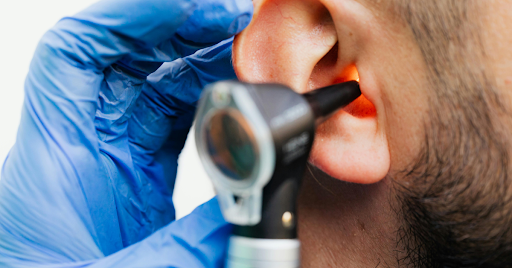Nosebleed Or Epistaxis: Symptoms Causes Treatment
3 min read
By DocGenie , Published on - 25 May 2022Nosebleed or blood loss from the nose is a very common condition. Nearly 60% of people all over the world experience nosebleed at least once in their lifetime. In simple terms, nosebleed means blood from the tissue that lines your nose. Nosebleed generally occurs from one nostril. However, it can occur from both nostrils as well. Though the nosebleed might look frightening, in most cases, it is not serious. That said, if it is accompanied by certain symptoms, you should consider getting checked by an ENT specialist.
Symptoms of nosebleeds that need medical intervention
- Frequent nosebleeds - this could be a sign of an underlying condition
- Heavy bleeding from the nose – This type of nosebleed starts from the back of the nose and occurs in the large blood vessels
- Bleeding after an injury
- The bleeding hasn’t stopped after 20 minutes
- Difficulty breathing
- Vomiting
If you experience the above symptoms you might need immediate medical attention. You can consider consulting an ENT specialist online on DocGenie for timely diagnosis and treatment.
Causes of nosebleed
The most common causes of nosebleeds are –
- Dry air
- Nose picking or inserting objects into the nose
- Colds (upper respiratory infections) and sinusitis
- Blowing the nose forcefully
- Allergic and non-allergic inflammation of the nasal lining
- Blood-thinning drugs, cocaine, and other drugs inhaled through the nose
- Chemicals in cleaning supplies, chemical fumes, strong odors
- High altitudes
- Frequent use of nasal sprays and medications
- Deviated septum, facial and nasal injury or surgery; nasal tumors and polyps
- Unusual bruising on the body
Although anyone can get a nosebleed, the following individuals are more prone
- Allergies, dry air, common cold, and sticking fingers or objects into the nose make children between 2-10 years of age more prone to nosebleeds.
- Adults between 45 and 65 years of age are more prone to nosebleeds as blood often takes longer to clot at this age. Blood-thinning drugs, high blood pressure, atherosclerosis, or bleeding disorders like hemophilia or von Willebrand also make such adults prone to this condition.
- Pregnant women could also get nosebleeds as the blood vessels in the nose enlarge during pregnancy. These enlarged blood vessels then put extra pressure on the delicate blood vessels in the lining of the nose causing nosebleeds.
Also read: When You Should See an Ear, Nose, and Throat Specialist
Treatment
Nosebleeds usually stop by following a simple step. You will have to bend forward a little and pinch your nose against the hard bony ridge for about 5 minutes.If it still bleeds, continue pinching for another 10 minutes. You can also apply an ice pack to help tighten blood vessels and provide comfort. If the nosebleed does not stop after doing this, a visit to the clinic might be necessary.
A doctor might recommend the following procedures to stop a severe type of nosebleed
Nasal packing - Special nasal sponge or foam is inserted into your nose and left there for 24 to 48 hours.
Cauterization - Applying a chemical or heat energy to seal the bleeding blood vessel.
Medication change - Reducing or stopping the number of medications you take.
Foreign body removal - If the nose bleed happens due to this.
Surgical repair – Surgery is done in case a nosebleed is caused by a broken nose or a deviated septum.
Ligation - A procedure that ties off the problematic blood vessel to stop the bleeding.
Also read: Ear Nose and Throat (ENT) Problems and Treatments
DocGenie is an online telemedicine platform that provides you with quality healthcare from the comfort of your own space. On DocGenie, you can book an online consultation with highly qualified doctors as well as book lab tests for home collection.
Author Details

Dr.Rachna Kucheria
MD (Community Medicine) AIIMS New Delhi
MD (Family Medicine) USC California
Obesity Medicine Certification The American Board of Obesity Medicine
30+ Years of experience


